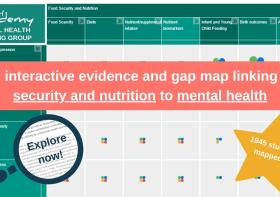Political Economy of Agri-Nutrition
Details
The Political Economy of Agri-Nutrition Working Group (2021-present) was constituted to advance knowledge and research practice related to political economy of food in the global South; to synthesise political economy of food theoretical frameworks in relation to diets and nutrition; and to develop methodological frameworks to address the macro-micro gap in agri-nutrition analysis.
Background
The commodification of food and the concentration of corporate power have contributed to profound changes in diet. However, food industry practices are overlooked in research and policy on the nexus between agriculture and nutrition (Agri-Nutrition) (Nestle, 2013; Popkin, 2014). A political economy enquiry of Agri-Nutrition is necessary to explore these dynamics and capture the root causes of nutrition outcomes. Research in this area should emphasize (i) relations of power in agri-food production and consumption, (ii) interdisciplinary approaches that allow for linking global and local dimensions, (iii) the importance of geographical and historical contextualisation.
Political economy approaches to the study of agricultural and food systems have produced rich scholarship and practice, ranging from Food Regimes (Friedman & McMichael, 1989), Systems of Provision (Fine, 1994), and Food Sovereignty (Edelman, 2014) to mention a few. Why do these theories not occupy a more prominent space in the debates, research and practice in Agri-Nutrition research? Which methodological aspects need to be addressed to bridge the macro analysis of power in food systems (institutional factors, geo-political factors, global economic trends) and micro-level dynamics (food consumption and nutrition outcomes, everyday food experiences differentiated along lines of gender, class, sexuality, race, ethnicity, physical abilities and citizenship)?
The ANH Academy Technical Working Group (WG) on Political Economy of Agri-Nutrition will be convened by an interdisciplinary group of experts. The WG will further define the scope and objectives once the collective is formed, but generally will focus its work on two objectives: 1) providing a landscape map on theoretical frameworks in the political economy of food and identifying the key connections with nutrition outcomes; and 2) identifying methodological approaches, synergies and gaps in the political economy of food and political ecology.
Objectives
The objectives of the Working Group are twofold:
Objective 1: Synthesis of political economy of food theoretical frameworks in relation to diets and nutrition. Guiding questions include:
- What are the main political economy of food theories and how they address the historical and geo-political challenges/threats during which they were developed?
- What are the conclusions to be drawn from existing frameworks in relation to diets and nutrition?
- What are the common problems or barriers, especially as they related to implementation agri-nutrition research, that are not sufficiently addressed by existing theories?
- What are the research considerations for focusing on specifically as it relates to FNS? Have these been considered already or is there a need to develop guidance on these?
- What are the missing pieces on the intersections between agri-health research and political economy of food, especially on methods and metrics, that would be the most powerful in programmes, action, advocacy?
Objective 2: Identifying methodological gaps and provide advancements on micro-macro linkages and cross-framework analytical approaches. Guiding questions include:
- Are the existing methods, tools and metrics for political economy of food sufficient and fit-for-purpose?
- Are the strengths and weaknesses of these easily accessible/digestible for implementers and researchers? Is it possible to make good decisions about research design and methodology based on the guidance that exists?
- How should approaches to linking political economy of food with agri-nutrition be consolidated?
- What are the key ways in which these methodological gaps and unlinked approaches impede action?
- What are the major barriers for those wanting to link political economy of food and agri-nutrition in programmes? Why do these exist?
Members
Co-chairs:
- Fiorella Picchioni, Fellow in Gender and Diversity in Food Systems , Natural Resources Institute, University of Greenwich.
- Sara Stevano, Senior Lecturer in Economics, SOAS, University of London
Core members:
- Busiso Moyo, Doctoral Candidate, University of Western Cape
- Siera Vercillo, Postdoctoral Fellow of Development and Environmental Studies, University of Waterloo
- Joe Yates, Research Fellow & ANH Academy Co-Director, London School of Hygiene & Tropical Medicine
- Adwoa Yeboah Gyapong, PhD Researcher in Development Studies, Erasmus University Rotterdam
Advisory Group
- Scott Drimie, Director, Southern Africa Food Lab & Adjunct Professor, University of Stellenbosch
- Bill Moseley, Professor of Geography, Macalester College
- Dzodzi Tsikata, Professor of Development Sociology, University of Ghana










